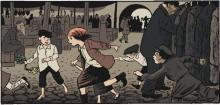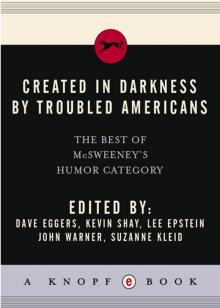- Home
- Dave Eggers
Zeitoun Page 4
Zeitoun Read online
Page 4
Meanwhile, Yuko’s friend had been set up with Ahmaad’s friend, and though they courted for a few months, that relationship came to an end. Ahmaad, as promised, let Zeitoun know that Yuko’s friend was now single. It was only then that Zeitoun was told her name: Kathy.
“Kathy?” Zeitoun asked. He hadn’t known too many Muslims named Kathy. “Kathy what?”
“Kathy Delphine,” Ahmaad said.
“She’s American?”
“She’s from Baton Rouge. She converted.”
Zeitoun was more intrigued than ever. It took a courageous and self-possessed woman to take such a step.
“But listen,” Ahmaad said. “She’s been married. She has a two-year-old son.”
This did nothing to dissuade Zeitoun.
“When can I see her?” he asked.
Ahmaad told him she worked at a furniture store, and gave Zeitoun the address. Zeitoun formulated a plan. He would park out front and observe her unnoticed. This was, he told Ahmaad, Jableh style. He didn’t want to make a move, or allow anyone representing him to mention his intentions, before he could see her. This was the way of doing things where he’d come from: observe from afar, make inquiries, gather information, then meet. He wanted no confusion, no hurt feelings.
He pulled into the furniture store’s parking lot at about five o’clock one day, planning to wait and watch as she left at the end of her shift. He was just settling in for his stakeout when a young woman burst through the door, wearing jeans and a hijab. She was striking, and very young. She tucked a few strands of hair into her scarf and looked around the parking lot. And then she was walking again, striding with a powerful confidence, her hands flying about as if she were drying just-painted fingernails. Then she broke into a private smile, as if recounting something that had made her laugh. What was it? Zeitoun wondered. She was beautiful, fresh-faced, and the smile was everything—wide, shy, electric. I want to make her smile like that, he thought. I want to be the one. I want to be the reason. He liked her more with every step she took toward him. He was sold.
But she was getting too close. She was heading straight for him. Did she know he had come to see her? How was this possible? Someone had told her. Ahmaad? Yuko? She was almost at his car. He would look foolish. Why was she coming right at him? He wasn’t ready to meet her.
Not knowing what else to do, he ducked. Crouching below his dashboard, he held his breath and waited. Please God, he thought. Please. Would she pass by, or would she appear at his window, wondering about the man trying to disappear below her? He felt ridiculous.
Kathy, though, had no idea she was passing a man hiding under his steering wheel. Her car just happened to be parked next to his. She unlocked her door, got in, and drove off.
When she was gone, Zeitoun righted himself, breathed a sigh of relief, and tried to settle his stampeding heart.
“I need to meet her,” he told Ahmaad.
It was agreed that they would meet at Ahmaad and Yuko’s house. There would be a casual dinner, with Ahmaad and Yuko’s kids and Kathy’s son Zachary. It would be low-pressure, just an opportunity for the two of them to talk a bit and for Kathy, who had yet to even see Zeitoun, to meet this man who had inquired about her.
When she saw him, she liked his eyes, his handsome, gold-skinned face. But he seemed too conservative, and he was thirty-four to her twenty-one—well beyond the age she had imagined for a husband. Besides, it had been just two years since she’d left her first marriage, and she felt unready to begin again. She could think of nothing she needed from a man. She could certainly raise Zachary herself; the two of them had become a very good and streamlined team, and there seemed no reason to upset the balance of her life. She couldn’t risk the chaos that her first marriage had wrought.
After he left that night, Kathy told Yuko that he was a nice enough man, but she didn’t think it was a good match.
But over the next two years, she and Zeitoun saw each other occasionally. He would be at a barbecue at Ahmaad and Yuko’s, but out of deference to her—he didn’t want her to feel uncomfortable—when Kathy arrived, he would leave. He continued to ask about her, and once a year he sent an offhand inquiry through Yuko, just to be sure she hadn’t changed her mind.
Meanwhile, Kathy’s outlook was evolving. As Zachary grew, she began to feel guilty. She would take him to the park and watch the other boys playing with their fathers, and she began to wonder if she was being selfish. A boy needs a dad, she thought. Was it unfair to dismiss the possibility of a father figure in Zachary’s life? Not that she was ready to act on these notions, but there was a slow thaw occurring within her. As the years went by, as Zachary turned three and then four, she grew more open to the idea of someone new.
* * *
Kathy called Zeitoun in the early afternoon.
“Let’s wait and see,” he said.
“That isn’t why I’m calling,” she said.
A client on the West Bank wanted a bathroom repainted.
“Really? We just finished that one,” he said.
“She doesn’t like how it looks.”
“I told her that color was wrong. Tangerine.”
“Well, now she agrees with you.”
“I’ll go now,” he said.
“Don’t rush,” she said.
“Well, make up your mind.”
“I just don’t want you driving fast,” she said. Kathy worried about his driving, especially when there were people worried about a coming storm. She knew Zeitoun considered himself a good driver, but when they rode together she was a jumble of nerves.
“Kathy, please—” he started.
“I just get scared when you drive!”
“I ask you,” he said, beginning what Kathy knew was one of his frequent thought experiments. “Let’s say the average person drives maybe two hours a day, every day, and that person gets, on average, two tickets a year. I drive maybe six hours each day. How many tickets should I have? This is what I ask.”
“I’m just saying, I personally get scared.”
“I get only two, three tickets a year, Kathy! I knew this man, a cab driver in New York for thirty years. No license, and this man—”
Kathy didn’t want to hear about the man in New York. “I’m just saying …”
“Kathy. Kathy. In Syria we have a saying, ‘The crazy person talks, the wise person listens.’”
“But you’re the one talking.”
Zeitoun had to laugh. She always got the best of him.
“I’ll call you later,” she said.
Zeitoun headed to the West Bank to get a look at the tangerine bathroom. He tried to be amused by the fickle nature of clients’ tastes; it was part of the job, and if he got exasperated every time someone changed their mind, he’d never survive. The upshot was that it ensured no day was dull. The intensely personal nature of his business, the subjectivity of taste, the variables of light and curtains and carpets, guaranteed that minds would reevaluate and work would have to be redone.
Still, the most unusual requests often came from the most normal-seeming people. One customer, a Southern belle in her sixties, had called Zeitoun Painting and had been happy to talk with Kathy, with her chatty demeanor and familiar accent. But when the painters showed up to begin work on the exterior of her home, the woman immediately called Kathy.
“I don’t like these men,” she said.
“What’s wrong with ’em?” Kathy asked.
“They’re swarthy,” she said. “I only want white people working on my house.” She said it like she was choosing a kind of dressing for her salad.
“White people?” Kathy laughed. “Sorry, we’re fresh out of those.”
She convinced the woman that the men who had been sent—all of them Latino, in this case—were skilled professionals who would do an excellent job. The woman assented, but continued to call. “He’s too short to be a painter,” she said about one worker, Hector, who was over six feet tall. Realizing that no matter how much she complain
ed, she would not be able to replace these painters with taller, Caucasian ones, the Southern belle resigned herself to watching the men, checking on them frequently.
Of course, every so often, would-be clients could not get past Zeitoun’s last name. They would call for an estimate and ask Kathy, “Zeitoun, where’s that name come from? Where is he from?” And Kathy would say, “Oh, he’s Syrian.” Then, after a long pause or a shorter one, they would say, “Oh, okay, never mind.” It was rare, but not rare enough.
Kathy sometimes told Zeitoun about such incidents, sometimes not, and never at dinner. Usually he just laughed it off, but occasionally it got under his skin. His frustration with some Americans was like that of a disappointed parent. He was so content in this country, so impressed with and loving of its opportunities, but then why, sometimes, did Americans fall short of their best selves? If you got him started on the subject, it was the end of any pleasant meal. He would begin with a defense of Muslims in America and expand his thesis from there. Since the attacks in New York, he would say, every time a crime was committed by a Muslim, that person’s faith was mentioned, regardless of its relevance. When a crime is committed by a Christian, do they mention his religion? If a Christian is stopped at the airport for trying to bring a gun on a plane, is the Western world notified that a Christian was arrested today and is being questioned? And what about African Americans? When a crime is committed by a black man, it’s mentioned in the first breath: “An African American man was arrested today …” But what about German Americans? Anglo Americans? A white man robs a convenience store and do we hear he’s of Scottish descent? In no other instance is the ancestry mentioned.
Then Zeitoun would quote the Qur’an.
Be one who is staunch in equity,
witnesses for God
even against yourselves
or ones who are your parents or nearest of kin;
whether rich or poor,
for God is closer to both than you are;
so follow not your desires
that you become unbalanced;
and if you distort or turn aside,
then truly God is aware of what you do.
Kathy was astonished at how well he knew the book, and how quickly he could quote a passage appropriate for any occasion. Still, though, these monologues at dinner? It was good for the kids to have some awareness of such prejudices, but to see Zeitoun disappointed, to get him so worked up after a long day—it wasn’t worth it. In the end, though, Zeitoun could laugh this kind of thing off, but the one thing he could not abide was a client raising their voice to Kathy.
There had been one client, a young woman married to a doctor. She was thin, pretty, immaculately put together. She had not set off any alarm bells when Zeitoun had provided an estimate and begun work on painting her stairway and guest bedroom. She told him that she and her husband were expecting houseguests, and she wanted the stairway and guest room painted in five days’ time. Zeitoun said the timetable would be tight, but would present no problems on his end. She was thrilled. No other painter had been able to commit to such a deadline.
Zeitoun sent a crew of three over the next day. The client, seeing the quick and efficient work Zeitoun’s team was doing, asked him if they could paint her husband’s office and her daughter’s bedroom, too. He said they could. He sent more painters to the house, and she continued to add rooms and jobs—including re-tiling and painting a bathroom—and Zeitoun’s men continued to execute the work quickly.
But not quickly enough. On the third day, Kathy phoned Zeitoun, near tears. The woman had called Kathy four times in rapid succession, cursing and carrying on. The house wasn’t ready, the client had screamed, and her guests were coming in less than two days. Kathy had told her that Zeitoun’s crew had finished the original work on the guest room in plenty of time. But this wasn’t what the client wanted. She wanted everything—all seven rooms and their myriad tasks—done in five days. She wanted three times the work done in the same amount of time.
Kathy had tried to reason with her. She and Zeitoun had never promised that he could finish all of the additional work in five days. That schedule was irrational; no one, not even Zeitoun A. Painting Contractor LLC, could complete the work on that timetable. But the client was beyond reason. She barked at Kathy, hanging up, calling again, hanging up. She was loud, condescending, and cruel.
Kathy, in tears, reached Zeitoun on his cell phone while he was driving to a job on the other side of the city. Even before they hung up, he had turned his truck around and was barreling to the client’s house as fast as was legal. When he got there, he walked calmly into the house and told his crew they were leaving. In the space of ten minutes, they packed their paint, ladders, brushes, and tarps, and loaded them into the bed of Zeitoun’s truck.
As Zeitoun was backing out, the client’s husband ran out to the truck. What’s wrong? he asked. What happened? Zeitoun was so angry he could barely think of the words in English. It was better, in fact, that he did not speak. He waited a few seconds to say only that no one talked that way to his wife, that he was leaving the job, that this was over and good luck.
When he arrived at the tangerine-bathroom house, he called Kathy to run through the prices for the materials they’d need. Looking around the orange room—it really was difficult to look at—he noted the clients’ new tub, a huge claw-footed antique.
“It’s big, but isn’t it beautiful?” Kathy asked.
“Yes, like you!” he joked.
“Watch it,” she said. “I can lose this weight, but you’re never growing that hair back.”
When they’d met, Kathy had been weight-obsessed, and was far too thin. She had been chubby as a child, at least to some eyes, and in her teens her weight fluctuated wildly. She binged and dieted and then cycled through it all again. When she and Zeitoun were married, he insisted that she get beyond the weight issues and eat like a normal person. She did, and now joked that she’d gone too far. “Thank God for the abaya,” she told friends. When she didn’t want to bother worrying about clothes or how they looked on her, the shoulder-to-floor Islamic dress solved the problem, and tidily.
There was a knock on the door. Kathy went to answer it and found Melvin, a Guatemalan painter. He was looking to get paid before the weekend.
Zeitoun was relentless in his efforts to pay the workers well and promptly. He always quoted the Prophet Muhammad: “Pay the laborer his wages before his sweat dries.” Zeitoun used that as a bedrock and constant guide in the way he and Kathy did business, and the workers took note.
Still, Zeitoun preferred to pay on Sundays or Mondays—because when he paid on Fridays, too many of the workers would disappear all weekend. But Kathy’s heart was soft, her resolve to withhold payment even an hour weakened in the presence of these workers soaked with sweat, knuckles bleeding, forearms yellow with sawdust.
“Don’t tell Zeitoun,” she said, and wrote him a check.
Kathy turned on the TV and flipped through the channels. Every station was covering the storm.
Nothing had changed: Katrina was still headed their way, and it was losing no power. And because the hurricane as a whole was traveling so slowly, about eight miles per hour, the sustained winds were causing, and would continue to cause, catastrophic damage.
The coverage was just background noise, though, until Kathy caught the words “family of five.” They were talking about the family lost at sea. Oh no, she thought. Please. She turned up the sound. They were still missing. The father’s name was Ed Larsen. He was a construction supervisor. You’re kidding me, she thought. He had taken the week off to take his family sailing on his yacht, the Sea Note. They had been at Marathon and were sailing back to Cape Coral when they’d lost radio contact. His wife and three kids were with him. They were on their way back to shore for a family reunion. The extended family had gathered only to realize that the Larsens were missing; the celebration turned into a vigil of worry and prayer.
Kathy couldn’t stand
it.
She called her husband. “We have to go.”
“Wait, wait,” he said. “Let’s wait and see.”
“Please,” she said.
“Really?” he said. “You can go.”
* * *
Kathy had taken the kids north a handful of times when storms had gotten close. But she was hoping she wouldn’t have to make the trip this time. She had work to do over the weekend, and the kids had plans, and she always came back from those trips more exhausted than when she’d left.
Almost without exception, whether it was fleeing a storm or for a weekend vacation, Kathy and the kids had to go without Zeitoun. Her husband had trouble leaving the business, had trouble relaxing for days on end, and after years of this vacationless life Kathy had threatened to pack the kids and just leave for Florida some Friday after school. At first Zeitoun hadn’t believed her. Would she really pack up and leave with or without him?
She would, and she did. One Friday afternoon, Zeitoun was checking on a nearby job and decided to stop at home. He wanted to see the kids, change his shirt, pick up some paperwork. But when he pulled into the driveway, there was Kathy, loading up the minivan, the two youngest already buckled inside.
“Where you going?” he asked.
“I told you I’d go with or without you. And we’re going.”
They were going to Destin, Florida, a beach town on the Gulf about four hours away, with long white beaches and clear water.
“Come with us, Daddy!” Nademah pleaded. She had just come out of the house with their snorkeling gear.
Zeitoun was too stunned to react. He had a hundred things on his mind, and a pipe at one of the rental properties had just burst. How could he go?

 A Hologram for the King
A Hologram for the King Heroes of the Frontier
Heroes of the Frontier A Heartbreaking Work of Staggering Genius
A Heartbreaking Work of Staggering Genius The Best American Nonrequired Reading 2013
The Best American Nonrequired Reading 2013 How We Are Hungry
How We Are Hungry The Circle
The Circle What is the What
What is the What The Museum of Rain
The Museum of Rain The Captain and the Glory
The Captain and the Glory Up the Mountain Coming Down Slowly
Up the Mountain Coming Down Slowly The Parade
The Parade The Monk of Mokha
The Monk of Mokha Your Fathers, Where Are They? And the Prophets, Do They Live Forever?
Your Fathers, Where Are They? And the Prophets, Do They Live Forever? You Shall Know Our Velocity
You Shall Know Our Velocity The Wild Things
The Wild Things 2006 - What is the What
2006 - What is the What The Best American Nonrequired Reading 2011
The Best American Nonrequired Reading 2011 Created in Darkness by Troubled Americans
Created in Darkness by Troubled Americans